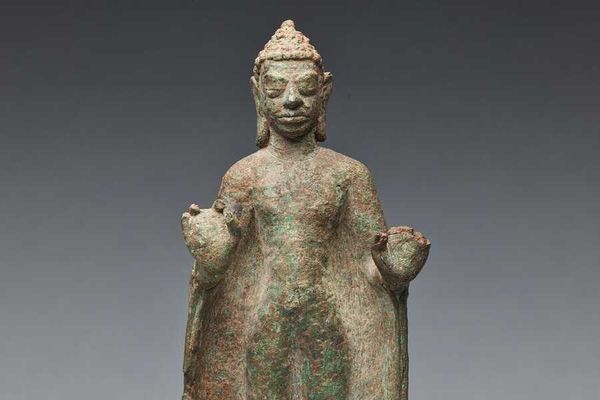Heavy with gloom and so pervasively violent that a single misstep might have reduced it to macabre comedy, Red Riding: 1974 has the feeling of a nightmare. This is no accident.
Director Julian Jarrold (Becoming Jane) favors his lighting dim and his skies oppressively bleak, mitigated only by illuminating flashes so brilliant as to be blinding. If they seem to suggest a break from the grim reality of Tony Grisoni’s story, about a journalist investigating a series of child murders in Yorkshire, the illusion is fleeting. At no time is 1974, the first episode of the Red Riding trilogy released last year for BBC television, anything close to cheery
If the movie’s pervading sense of impending doom is laid on so thick it’s suffocating, Jarrold is aided and abetted by Grisoni’s glum screenplay, faithfully adapted from David Peace’s historically inspired 1999 novel. Jarrold is more successful in creating a mood than in piecing together a coherent narrative – 1974 is all feverish paranoia, justified, as it turns out, by the bogeymen Eddie Dunford (Andrew Garfield, of Lions for Lambs) is hunting – but the feeling stays with you.
Dunford is cut from the same cloth as another fictional investigator, Philip Marlowe – smart, underachieving and usually on the receiving end of a punch, or worse. He is apathetic at the start, assessing the victims he’s writing about as little more than front-page fodder. In the brutal slaying of a young girl he sees a career opportunity. But her tragedy of, and that of all the people whose lives are irreparably shattered by the whims of a monster, soon becomes his foremost concern.
Drowning in a rising tide of blood, he seeks the source, and finds men of privilege protected by crooked cops. He resists their warnings to look the other way – his indignation, once aroused, is a consuming obsession. He attacks his job with the tenacity of a pit bull, albeit one that can’t win a fight.
Yet toothless he’s not. Like Marlowe, Dunford is clever enough to throw a scare into the demons he’s chasing, including John Dawson, a slick, sadistic power broker played with reptilian charm by Sean Bean. But if there is a lesson to be gleaned from the Red Riding trilogy, it is that good intentions are an express ticket to the grave. With the police in their pockets, men like Dawson are shielded from justice. There is no room for heroes in their dens of corruption.
That much becomes clearer in James Marsh’s 1980, in which an outside investigator, suspicious of the West Yorkshire detectives whose company he reluctantly keeps, arrives from Manchester to examine another botched case, inching closer to the truth but unable to bring it to light.
Peter Hunter (Paddy Considine, of The Bourne Ultimatum) isn’t the punching bag that Dunford is – he is afforded a veneer of professional courtesy by most of his colleagues, though one of them, a defiantly obstinate thug named Bob Craven (Sean Harris), lets him know he’s not welcome. Hunter takes over the search for the notorious Yorkshire Ripper, behind whose 13 real-life murders the police have been hiding some of their own, but the investigator’s efforts are derailed prematurely by a well-organized smear campaign.
The Ripper is apprehended, with Hunter relegated to the sidelines, but even this is a hollow victory. Yorkshire continues to decay from within, and the rogue cops responsible remain unaccountable.
Marsh depicts their transgressions in a fashion far more straightforward than Jarrold’s, and for that we can be grateful: If 1974 establishes the trilogy’s tone, 1980 helps us make sense of Grisoni’s story. Critical details emerge, characters previously in the shadows step to the forefront, and at last we begin to understand what Dunford and Hunter are up against – the unchecked depravity of men drunk with power and driven by greed, who will stop at nothing to conceal their crimes.
The trilogy’s third act, 1983, is a similarly unvarnished affair, directed by Anand Tucker (Hilary and Jackie), and for the first time we sense cause for hope. Can the righteous – embodied here by an unkempt lawyer (Mark Addy, of The Full Monty) and a dirty cop (David Morrissey) whose conscience compels him to take a stand – stem the tide of corruption? Even after so much bloodshed, it seems strangely possible.
The last chapter deals with another child murder, similar to the so-called Moors murders documented in 1974, and some begin to suspect that the man convicted of those earlier killings might have been goaded into a false confession. John Piggott (Addy) effectively reopens the case, and though his fact-finding techniques are neither as savvy as Hunter’s nor as dogged as Dunford’s, he gets results.
Joining his cause, however hesitantly, is Maurice Jobson (Morrissey), a high-ranking policeman whose tolerance for brutality has been exhausted. He stymies Piggott at first, clinging to the lies he’s been selling for nearly a decade, but his heart is no longer in it. In an eleventh-hour bid for redemption, he sets out in pursuit of a well-connected predator who, after drifting in and out of the story until now, reveals his amoral depths in 1983.
Rarely has human misery arrived in such a handsome package. Taken individually, the Red Riding movies are as stylish and morbidly enthralling as they are repellent; together, the parts add up to an immensely satisfying whole. (As a stand-alone, 1974 works best, though 1980 is ultimately more rewarding, and loaded with bigger surprises.) It’s doubtful audiences will tolerate such a sobering ride over five-plus hours, though viewing the films in succession is the most efficient way to navigate their many twists and turns.
The performances in all three movies are uniformly impressive, with Garfield, Considine and Morrissey skillfully anchoring their respective chapters. Other standouts include Bean, who has a gift for playing villains both seductive and deadly, and Rebecca Hall (Vicky Cristina Barcelona) who plays a grieving mother forced into a most compromising position in 1974.
Those electing to view the movies via cable’s IFC On Demand should consider taking advantage of closed captioning. The Yorkshire accents are thick and sometimes difficult to understand, particularly in 1974, the murkiest of the three thrillers even without the added complication of a language barrier. By the time we arrive at 1983’s rousing climax, the intricacies of Peace and Grisoni’s stories have been powerfully illuminated, and we are left to contemplate their messy aftermath, emotionally battered but relieved to have reached the light at the end of a very dark tunnel.
Red Riding: 1974 is now playing at the Lumiere Theatre in San Francisco and the Shattuck Cinemas in Berkeley. It is available to cable subscribers via IFC On Demand.




















